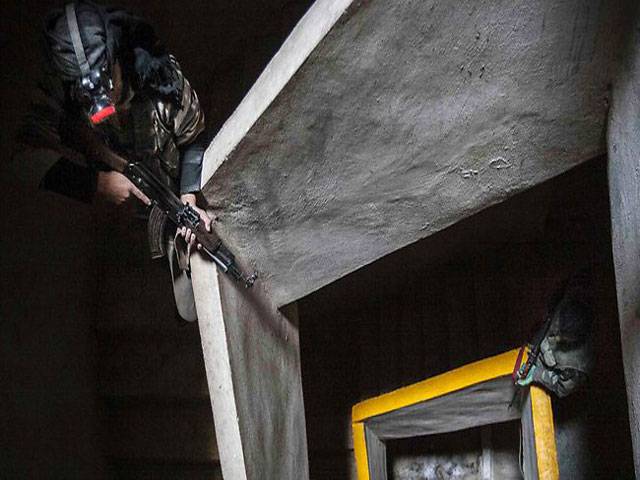DAMASCUS - Troops waged fierce assaults on rebels around Syria on Thursday, focusing on the capital’s outskirts, amid growing concerns that an increasingly desperate regime might resort to chemical weapons.
Those fears are likely to be raised during Thursday talks in Dublin between the top Russian and US diplomats and the international peace envoy, with the UN chief saying President Bashar al-Assad must face justice if he uses his chemical arsenal.
Assad forces shelled Douma and Zabadani to the northeast of the capital and Daraya and Moadamiyet al-Sham to the southwest, official and activist sources said.
As the army escalated its assault on rebel-held Daraya, the scene in August of the single worst massacre in Syria’s 21-month conflict, additional troops were deployed to the town.
“Syrian army units continued today to pursue terrorists loyal to Al-Nusra Front, which is part of Al-Qaeda, in Daraya,” state news agency SANA said.
Citing an unnamed military source, the agency also said “Daraya will be completely cleansed of terrorists soon,” using its standard term for rebels.
At the same time, there were clashes in Irbin to the east, the Syrian Observatory for Human Rights said.
In the capital itself, security forces swarmed the southern district of Zahra after a car bomb exploded, with the Observatory saying no one was killed.
But state television said “Al-Qaeda terrorists exploded a bomb in a car in front of a Red Crescent centre in Damascus, causing one death and major damage.”
Damascus province is now a key battlefield, as regime forces battle to retake control of an eight-km belt around the capital, analysts say. In the embattled northern city of Aleppo, several districts saw clashes, while shells slammed into zones in the southern province of Daraa, the Observatory said.
The Observatory said the fighting had claimed 104 lives across the country, according to a toll compiled from a network of activists, lawyers and doctors.
The Britain-based watchdog has tallied more than 41,000 deaths, most of them civilians, since the uprising erupted in March 2011.
In Dublin, US Secretary of State Hillary Clinton will meet Russian Foreign Minister Sergei Lavrov and UN peace envoy Lakhdar Brahimi amid fears the regime could be preparing to use chemical weapons as it battles the rebels.
Clinton warned Damascus on Wednesday that this was a clear red line that must not be crossed.
Speaking in Baghdad on Thursday, UN chief Ban Ki-moon said Assad should be “brought to justice” if his regime uses chemical weapons. He said he had warned that whoever does so “will have to be brought to justice, and it will create serious consequences to those people.”
Clinton also again pressed the Assad regime to make “the decision to participate in a political transition, ending the violence against its own people.”
Assad’s deputy foreign minister said on Thursday Western powers are whipping up fears of a fateful move to the use of chemical weapons in Syria’s civil war as a “pretext for intervention”.
He spoke as Germany’s cabinet approved stationing Patriot anti-missile batteries on Turkey’s border with Syria, a step requiring deployment of Nato troops that Syria fears could permit imposition of a no-fly zone over its territory.
“Syria stresses again, for the tenth, the hundredth time, that if we had such weapons, they would not be used against its people. We would not commit suicide,” Faisal Maqdad said.
Moscow has been a staunch ally of Assad and along with China has vetoed UN Security Council resolutions aiming to sanction the regime. Washington has long been calling for Moscow to use its leverage with Assad to try to persuade him to step down, and open the way towards a political transition.
Russian President Vladimir Putin met Turkish Prime Minister Recep Tayyip Erdogan in Istanbul on Monday on a trip focused on resolving sharp differences over the conflict.
Last month, Erdogan said Russia held the key to the Syrian conflict, and that if Moscow took a “positive” stance in the Security Council it could push another key Damascus ally, Iran, to review its policies.
In another development, Syria’s new ambassador to Iraq has taken up his post in Baghdad, five months after his predecessor defected and joined the country’s anti-regime revolt, the president’s office said on Thursday. Sattam al-Jadaan, named on October 9 to replace Nawaf Fares who defected in July, submitted his credentials to Iraqi President Jalal Talabani at a ceremony on Wednesday, it said.
The office, in a statement on its website, said Talabani “stressed the importance of relations between the two brotherly country” and his readiness to support Jadaan’s efforts “to make his mission in Iraq a success”.
Thursday, April 18, 2024
Syria clashes rage amid chemical arms fears

Eight more Sindh ministers sworn in
April 18, 2024
Housemaid found dead in home in Islamabad
April 18, 2024
Azerbaijan envoy calls on NA Speaker
April 18, 2024
SPSC starts viva of competitive exams 2020
April 18, 2024
Rail Revival
April 17, 2024
Addressing Climate Change
April 17, 2024
Saudi Investment
April 17, 2024
Political Reconciliation
April 16, 2024
Pricing Pressures
April 16, 2024
Justice denied
April 18, 2024
AI dilemmas unveiled
April 18, 2024
Tax tangle
April 18, 2024
Workforce inequality
April 17, 2024
New partnerships
April 17, 2024
ePaper - Nawaiwaqt
Advertisement
Nawaiwaqt Group | Copyright © 2024





